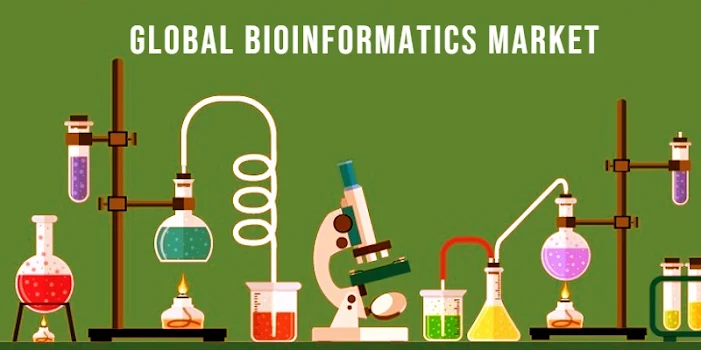Bioinformatics Market Analysis & Research Report
Bioinformatics market is changing rapidly with the ongoing expansion of the industry. The global bioinformatics market is estimated at US$14.29 billion in 2024, and is expected to reach a value of US$50.25 billion by 2034, expanding rapidly at a CAGR of 13.4% over the next 10 years.
 |
| Bioinformatics Market |
Global Bioinformatics Market: Unveiling the Growth Trajectory and Future Projections
The global bioinformatics market is expected to witness significant growth, with a projected CAGR of 13.4%. The bioinformatics market was valued at US$10.4 billion in 2022, and is expected to grow from US$11.9 billion in 2023 to US$24.73 Billion by 2027 and US$26.8 billion by 2030. By 2034, the market is expected to achieve a value of US$50.25 billion, indicating a noteworthy shift in its dynamics.
Bioinformatics is an interdisciplinary field that integrates biology, computer science, and information technology to organize and analyze biological data, and is rapidly expanding. Its pivotal role in genomics, drug development and personalized medicine is driving this growth.
The bioinformatics market is poised for significant expansion in the coming years, fueled by the exponential increase in biological data and advances in computational tools.
Integrating bioinformatics tools into genomics research stimulates groundbreaking discoveries, enhances access to personalized medicine, and promotes market expansion. The increasing volume of genomic data requires advanced bioinformatics tools and platforms to efficiently manage, analyze, and interpret the data.
Bioinformatics plays a critical role in identifying potential drug candidates, accelerating drug research, and reducing development costs.
Pharmaceutical companies are increasingly adopting bioinformatics to simplify their research endeavors.
Bioinformatics in Precision Medicine: Tailoring Treatment for Personalized Care
Precision medicine represents a transformative shift from the traditional one-size-fits-all medical approach. By leveraging advanced technologies such as genetics and bioinformatics, precision medicine aims to provide accurate diagnoses, predict disease risks, and provide individualized treatment strategies.
By examining a patient's genome, healthcare practitioners can identify genetic changes associated with specific diseases, assess susceptibility to various health disorders, and enable early detection of diseases. This proactive approach allows for timely interventions to effectively prevent or manage diseases.
In addition, the use of genetic information enables doctors to choose medications and treatments tailored to an individual's genetic profile, reducing the risk of adverse reactions and enhancing the effectiveness of treatment.
In oncology, genetic data helps accurately classify cancer, identify target mutations, and prescribe personalized drugs such as targeted therapies and immunotherapies. This approach has dramatically improved outcomes for cancer patients while reducing side effects associated with standard chemotherapy.
Precision medicine extends beyond cancer, to include medical areas as diverse as cardiology, neurology, and rare disorders.
Physicians can design specific treatments by uncovering the genetic basis of these disorders and targeting their root causes.
Dynamic Competitive Landscape in Bioinformatics Market
The competitive arena of the bioinformatics market is characterized by the dynamic interaction between established companies, emerging startups, and academic institutions. Leading the market in providing comprehensive bioinformatics solutions are key players such as Thermo Fisher Scientific, Illumina Inc., PerkinElmer Inc., BGI Group, and QIAGEN.
Thermo Fisher Scientific, a stalwart in life sciences solutions, offers a suite of bioinformatics tools tailored specifically for genomics research.
Illumina, globally recognized for its DNA sequencing technology, augments its platforms by integrating bioinformatics tools for seamless data processing.
PerkinElmer contributes to the market with an extensive range of genomics and life sciences software and services.
Specializing in sample and assay technologies, QIAGEN provides bioinformatics solutions focused on efficient data processing and interpretation.
Conclusion:
Bioinformatics is a rapidly evolving science, with new tools and methods emerging all the time. Bioinformatics is critical for managing and interpreting the vast genetic data sets that are generated.
Bioinformatics is important in many areas of biological research, including gene expression analysis, protein-protein interaction investigations, and pathway analysis..
Predictive analytics based on genomic data accelerate drug discovery, reduce development costs, and reduce clinical trial errors.
Artificial intelligence and machine learning tools can automate data analysis, uncover trends in the bioinformatics market, and provide insights that legacy methods may not provide.
Genomic technologies have improved our understanding of genetic variation, disease causes, and evolutionary processes through the use of bioinformatics.
The continued growth and advancement of genomic technology heralds larger datasets in the future, underscoring the importance of bioinformatics in understanding the goldmine of genetic information.
